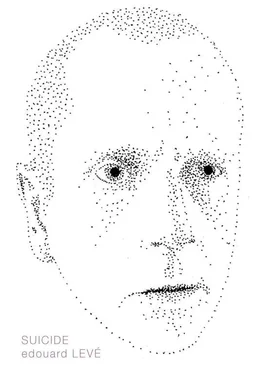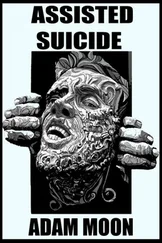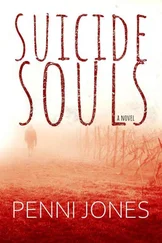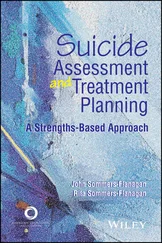Édouard Levé - Suicide
Здесь есть возможность читать онлайн «Édouard Levé - Suicide» весь текст электронной книги совершенно бесплатно (целиком полную версию без сокращений). В некоторых случаях можно слушать аудио, скачать через торрент в формате fb2 и присутствует краткое содержание. Город: Lonton, Год выпуска: 2011, ISBN: 2011, Издательство: Dalkey Archive Press, Жанр: Современная проза, на английском языке. Описание произведения, (предисловие) а так же отзывы посетителей доступны на портале библиотеки ЛибКат.
- Название:Suicide
- Автор:
- Издательство:Dalkey Archive Press
- Жанр:
- Год:2011
- Город:Lonton
- ISBN:978-1-56478-628-9
- Рейтинг книги:3 / 5. Голосов: 1
-
Избранное:Добавить в избранное
- Отзывы:
-
Ваша оценка:
- 60
- 1
- 2
- 3
- 4
- 5
Suicide: краткое содержание, описание и аннотация
Предлагаем к чтению аннотацию, описание, краткое содержание или предисловие (зависит от того, что написал сам автор книги «Suicide»). Если вы не нашли необходимую информацию о книге — напишите в комментариях, мы постараемся отыскать её.
, just a few days before he took his own life.
Suicide
Suicide
Suicide — читать онлайн бесплатно полную книгу (весь текст) целиком
Ниже представлен текст книги, разбитый по страницам. Система сохранения места последней прочитанной страницы, позволяет с удобством читать онлайн бесплатно книгу «Suicide», без необходимости каждый раз заново искать на чём Вы остановились. Поставьте закладку, и сможете в любой момент перейти на страницу, на которой закончили чтение.
Интервал:
Закладка:
Édouard Levé
SUICIDE
TRANSLATED AND WITH AN AFTERWORD BY JAN STEYN
One Saturday in the month of August, you leave your home wearing your tennis gear, accompanied by your wife. In the middle of the garden you point out to her that you’ve forgotten your racket in the house. You go back to look for it, but instead of making your way toward the cupboard in the entryway where you normally keep it, you head down into the basement. Your wife doesn’t notice this. She stays outside. The weather is fine. She’s making the most of the sun. A few moments later she hears a gunshot. She rushes into the house, cries out your name, notices that the door to the stairway leading to the basement is open, goes down, and finds you there. You’ve put a bullet in your head with the rifle you had carefully prepared. On the table, you left a comic book open to a double-page spread. In the heat of the moment, your wife leans on the table; the book falls closed before she understands that this was your final message.
I have never gone into this house. Yet I know the garden, the ground floor, and the basement. I’ve replayed the scene hundreds of times, always in the same settings, those I imagined upon first hearing the account of your suicide. The house is on a street, it has a roof and a rear façade. Though none of that is real. There’s the garden where you go out into the sunlight for the last time and where your wife waits for you. There is the façade she runs toward when she hears the gunshot. There is the entryway where you keep your racket, there’s the door to the basement and the stairway. Finally there’s the basement where your body lies. It is intact. From what I’ve been told, your skull hasn’t exploded. You’re like a young tennis player resting on the lawn after a match. You could be sleeping. You are twenty-five years old. You now know more about death than I do.
Your wife screams. No one is there to hear her, aside from you. The two of you are alone in the house. In tears, she throws herself on you and beats your chest out of love and rage. She takes you in her arms and speaks to you. She sobs and falls against you. Her hands slide over the cold, damp basement floor. Her fingers scrape the ground. She stays for fifteen minutes and feels your body go cold. The telephone brings her out of her torpor. She finds the strength to get up. It’s the person with whom you had a tennis date.
“Hello, what’s going on? I’m waiting for you.”
“He’s dead. Dead,” she responds.
The scene stops there. Who removed the body? The firemen? The police? Since murder can be disguised as suicide, did a forensic pathologist do an autopsy? Was there an inquest? Who decided that it was a suicide and not a crime? Did they question your wife? Were they sensitive or were they suspicious when talking to her? Did she have the pain of being a suspect added to the pain of your disappearance?
I haven’t seen your wife since. I hardly knew her. I met her four or five times. When the two of you got married, you and I stopped seeing each other. I see her face again now. It has remained unchanged for twenty years. I’ve retained a fixed image of her from the last time I saw her. Memory, like photographs, freezes recollections.
You spent your life in three houses. When your mother was pregnant with you, your parents lived in a small apartment. Your father didn’t want his children to grow up cramped. He used to say “my children,” although he only had the one at that point. With your mother, he visited a partially dilapidated château belonging to a retired colonel of the Légion who had never moved in because he deemed the place to be in too great a state of disrepair for it to be habitable. Your father, director of a public works contracting firm, didn’t seem put off by the scale of the repairs. Your mother liked the grounds. They moved in, in April. You were born in a clinic on Christmas day. A servant kept three fires going in the château at all times: one in the kitchen, one in the living room, and one in your parents’ bedroom, where you slept during the first two years of your life. When your brother was born, repairs had still not progressed. You lived in precarious luxury for three more years, until the birth of your sister. It was after your parents had decided to look for a more comfortable place that your father announced to your mother that he was leaving her. She found a house that was smaller and less beautiful than the château, but warmer and more welcoming. There you had your second bedroom, which you occupied until leaving to live with your wife at twenty-one years of age. The little house you shared with her contained your third bedroom. It was your last.
The first time I saw you, you were in your bedroom. You were seventeen years old. You were living in your mother’s house, on the first floor, between your brother’s and your sister’s bedrooms. You rarely left your room. The door was locked, even when you were inside. Your brother and your sister have no memory of ever entering it. If they had something to tell you, they would speak through the door. No one came in to clean up; you did it yourself. I don’t know why you came to open the door for me when I knocked. You didn’t ask who it was. What made you guess it was me? My manner of approach, of making the floorboards creak? Your shutters were closed. The room was bathed in a soft red light. You were listening to “I Talk to the Wind” by King Crimson, and you were smoking. It made me think of a nightclub. It was broad daylight outside.
Your wife only remembered later that before falling from the table, the comic book you had left there was open. Your father bought dozens of copies, which he gave to everyone. He came to know the text and the images of this book by heart; this was not at all like him, but he ended up identifying with the comic. He is looking for the page, and on the page for the sentence, that you had chosen. He keeps a record of his reflections in a file, which is always on his desk and on which is written “Suicide Hypotheses.” If you open the cupboard to the left of his desk, you’ll find ten identical folders filled with handwritten pages bearing the same label. He cites the captions of the comic book as if they were prophecies.
Since you seldom spoke, you were rarely wrong. You seldom spoke because you seldom went out. If you did go out, you listened and watched. Now, since you no longer speak, you will always be right. In truth, you do still speak: through those, like me, who bring you back to life and interrogate you. We hear your responses and admire their wisdom. If the facts turn out to contradict your counsel, we blame ourselves for having misinterpreted you. Yours are the truths, ours are the errors.
You remain alive insofar as those who have known you outlive you. You will die with the last of them. Unless some of them have made you live on in words, in the memory of their children. For how many generations will you live on like this, as a character from a story?
You went to a concert in Paris. At the end of the first set the singer cut open a vein and sprayed his blood over the first few rows, tracing out circular arcs with his arms. Your brown leather jacket got a few drops on it, which drops then got lost in its general color when they dried. After the concert, you went with the friends who were with you to a café, the name of which you forgot. You spoke to strangers for hours. Afterward you walked the streets in search of other cafés, but they were closed. You stretched out on the park benches of a square near the Gare Saint-Lazare, and you remarked on the shape of the clouds. At six o’clock you had breakfast. At seven you took the first train home. When, the next day, your friends repeated to you the words you had spoken to strangers in the café, you remembered nothing of them. It was as though someone else inside you had spoken. You recognized neither your words, nor your thoughts, but you liked them better than you would have if you had remembered saying them. Often all it took was for someone else to speak your own words back to you for you to like them. You would note down those sayings of yours that were repeated back to you. You were the author of this text twice over.
Читать дальшеИнтервал:
Закладка:
Похожие книги на «Suicide»
Представляем Вашему вниманию похожие книги на «Suicide» списком для выбора. Мы отобрали схожую по названию и смыслу литературу в надежде предоставить читателям больше вариантов отыскать новые, интересные, ещё непрочитанные произведения.
Обсуждение, отзывы о книге «Suicide» и просто собственные мнения читателей. Оставьте ваши комментарии, напишите, что Вы думаете о произведении, его смысле или главных героях. Укажите что конкретно понравилось, а что нет, и почему Вы так считаете.












